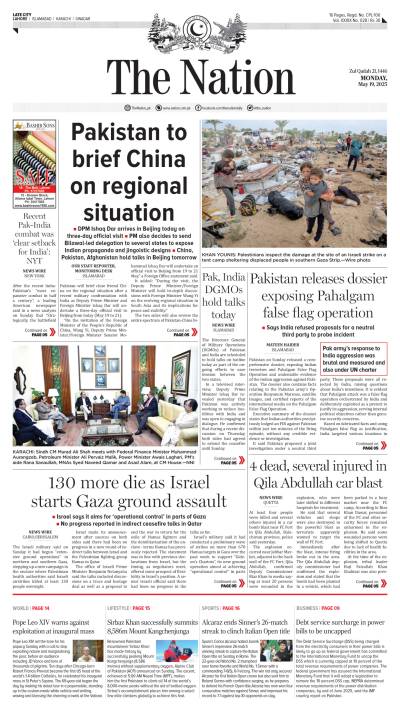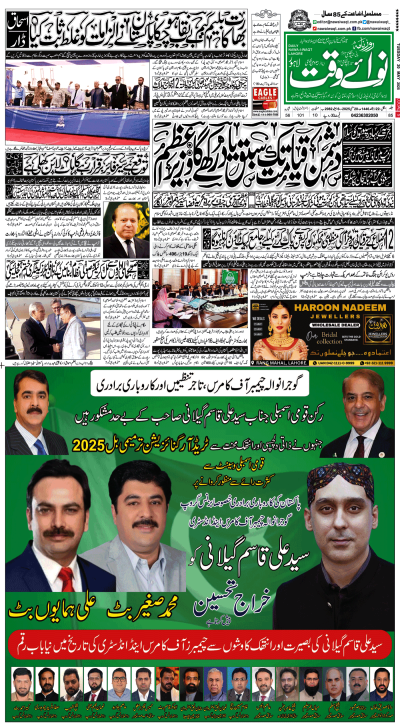Those who entice the masses and instigate them to violate the law are misusing the terms freedom and liberty to achieve their own interests and agenda. The promise of peaceful marches and sit-in has not been kept. Violence in Islamabad is an indication of indifference and politics of distasteful behaviours that negatively impact the internal and external environment of Pakistan. There is no end in sight of the resolution of the political crises. Those in revolt against the government are infact deliberately working on a plan to weaken the institutions of the state and to challenge the writ and the sovereignty of the Islamic Republic of Pakistan. They have damaged the image of Pakistan and are responsible for negatively affecting the nation’s already fragile economy.
The economic costs of the crises since 14th August has exceeded rupee 1300 billion. The political cost in context of Pakistan’s relations with other countries and international institutions is tremendous.
The joint session of parliament has fully supported the Prime Minister and reiterated that PM cannot be asked to resign unless charges of rigging election 2013 are proved against Mr. Nawaz Sharif. This view point is valid especially when all other demands of Imran and Qadri have been accepted.
As a senior analyst wrote , “what might stop Pakistani military from taking over is the realization that it does not have solutions to the very real economic problems the country faces. Therein is the real reason the marches have got as far as they have”.
Furthermore, there is an expressed feeling that requesting the Chief of Army Staff to mediate between the parties should be viewed as a serious setback for democracy in Pakistan. It was equivalent to admitting that elected government has failed to solve the crises on its own. There is someone in Pakistan the so called revolutionaries listen to.
How things will unfold is difficult to predict. And how the issues raised by PTI and PAT will be addressed and what consequences will it have for Prime Minister Nawaz Sharif and democracy in Pakistan? For appositive image Pakistan needs freedom from dictatorship, poverty, ignorance, extremism, terrorism and discrimination and prejudices of every kind and shape. An egalitarian society needs positive attitudes and abilities and capacity to assess people needs. Set goals, formulate strategy and policy to achieve results. Performance is a test of leadership.
The sit-in of PAT workers continued in front of the PM house as well as Pakistan Secretariat. One positive development in Islamabad was the reported decision of PTI MNA’s to attend joint session of parliament ( on Wednesday September 03, 2014 ) Parliamentary leader of PTI in National Assembly Shah Mehmood Qureshi along with other MNA’s of the party would answer the allegations of treasury as well as opposition point by point. It was also decided that after the speech of Shah Mehmood PTI would announce its resignations on the floor of the National Assembly. Qureshi did address the joint session but no resignations were announced and neither he demanded PM’s resignation.
Earlier, Tahir ul Qadri had asked Imran Khan not to send Qureshi to the Parliament saying “ it was a fake assembly”. However, Imran was of the view that they could clarify their stance while doing so. From this one gets the impression that dharna was nothing but a drama to pressurize the government and to fool the people at the cost of public inconvenience and tremendous loss to the national economy. Leaders of the PTI and PAT sit-in were having good time in an excursion and holiday mood. Leader’s life-style had not changed.
Writing on Imran’s long march, General (Rtd) Mirza Aslam Beg had stated, “That is what Imran Khan wants; to precipitate a situation where the army takes over as it has done in the past ending in regime change”. The same could be said of arrogant Qadri. The self-appointed messiah have only added to the problems of worrisome people of Pakistan. As Kamran Shafi wrote, “How is Tahir ul Qadri, an asylum-seeker turned Canadian national, turned multi-billionaire evangelist, allowed by a country to whose constitution and Monarch he has sworn fealty, to incite murder in another country”?
Pakistan needs leadership which is capable of evolving institutions. For progress the country needs unity and conducive environment.
Parliament vouches for democratic order, indicates need for improved style of governance, Nisar terms marchers terrorists, Achakzai calls them gypsies, Fazl questions army’s don’t use force call. In a cooperative mood the MPs expressed their support for the Prime Minister but with a caution.
Meanwhile effort by Awami Jirga has given hope for better cooperation and talks revival to resolve the political crisis. Separate meetings were held with Imran and Qadri; Siraj ul Haq asked government, marchers to show flexibility. Appreciation was expressed for those behind the scene working sincerely for resolving the crisis. Unity and cooperation that marked the joint session of the parliament is sure away forward for healthy and progressive Pakistan. Strengthening democracy is a long process of political maturity and understanding, the right attitudes and appropriate style and tone. It needs sincerity and determination. Out of the box approaches could help set out of blind alleys. And find ways to resolve the crises.
Need for preserving greater national interest necessitates cut in human development budget to ensure the funds for state security. Dharnas and long marches politics and other need the tremendous economic cost of funds for national security reflect on stress Pakistan is experiencing. It also explains why funds which should have been invested in human development are allocated to national security. Politicians cannot become leaders leading from front until they have developed an understanding of what is good for the people and what do people want?
Hopes are high as talks resumes between government and marchers. All parties agree to continue parleys. Multiple power centres and supporter of democracy have to work to strengthen institutions and to make Pakistan a model of development and a way forward. The whole nation has to honestly ponder on what has been happening around in Islamabad. Did the marches and sit-in actions contribute anything good to Pakistan’s political culture and democracy?
Non-democratic behavior and violence exposed the intentions of the rebels. One cannot but strongly agree that the carefully constructed veneer of neutrality that the army leadership had constructed through much of the national political crisis (instigated by Imran and Qadri) has been torn apart. The rebels wanted to break into and occupy state buildings, including Pakistan Television Corp. But it is the government that has been rebuked.
All that the sit-in accomplished was sending wrong signals to the world community and damaging the image of the state of Pakistan. It has been an exercise in seeking and grabing political power by self-appointed revolutionaries. The methodology used was crude and inappropriate and not acceptable by any standards. Overconfidence and arrogance exposed the actors in the situation and annoyed the people because this terrorism was against the state of Pakistan and the ideology and constitutional approach of the founder of Pakistan Muhammad Ali Jinnah.
Political stability plays an important role in keeping society integrated and in maintaining legitimacy within the state. The stability of political system has direct effects on the process of nation and state building. The culture of hate and violence is fatal. This should be taken as a wake-up call. The state is in danger with enemies within and without. Marches and sit-in play havoc with our economy and psyche. Positive thinking only could be our hope. The enemy is at our door.
The writer is a former director NIPA, a political analyst, a public policy expert and an author.
iftahmad786@hotmail.com





